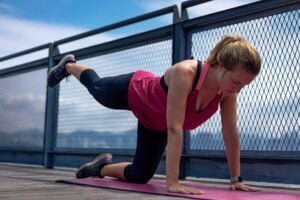If you struggle with stress eating, you probably have a set of tools to get through a craving or urge. For example, you might plan your meals, have an accountability partner, weigh regularly, and keep fresh fruits and veggies at your disposal. But how necessary is fitness to your battle with stress eating?
Whether you think of it as fitness, exercising, working out, or training, physical movement can help you get past food temptations, reign in your appetite, and crush stress eating.
Why we love endorphins.
 Your body releases endorphins when you exercise, even at a moderate pace, for ten or fifteen minutes. Endorphins affect your mood and appetite. The neurotransmitter dopamine leaves you feeling happy and on top of the world. It is what runners refer to as a “runner’s high.” Leptin decreases your appetite so that you feel less hungry and balances out the ghrelin levels, the hormone that increases appetite.
Your body releases endorphins when you exercise, even at a moderate pace, for ten or fifteen minutes. Endorphins affect your mood and appetite. The neurotransmitter dopamine leaves you feeling happy and on top of the world. It is what runners refer to as a “runner’s high.” Leptin decreases your appetite so that you feel less hungry and balances out the ghrelin levels, the hormone that increases appetite.
You may find that after training consistently for a while, your anxiety and depression lift thanks to endorphins. Our bodies were created to withstand physical stressors to build strength, so physical movement and training are beneficial and healing to the body. Wylie Christian Counseling can support you in integrating physical wellness with emotional and spiritual healing, helping you develop a holistic approach to mental health.
How to get started with fitness.
Before you start any fitness regimen, you should get clearance from your primary physician. This will rule out any medical issues and provide guidelines for you to follow. Next, you will want to take note of your weight and measurements.
You will also want a baseline level of performance. For example, can you walk a mile? How long does it take you to walk one mile? How many pushups can you do? Can you do a pullup? Try to touch your toes and record how far your reach is from your toes.
These are performance assessments that you can return to you as you progress in your fitness level. Also, consider keeping a journal to track your foods, mood, and workouts. Notice any patterns after a session. Are you craving protein after a workout as your muscles repair themselves and become stronger? Do you find that you eat healthier after a sweaty training session?
For fun, you could reward yourself with a sticker on each day of your workout calendar and try for a personal best each month.
Start with walking.
 If exercising is something you have not done for a long time, start slowly. Start a walking program. You can follow one from a video or podcast or create your own. You can find walk-at-home videos online that you can do in the privacy of your own home. Or you can listen to a walking podcast as you walk outdoors or on a treadmill.
If exercising is something you have not done for a long time, start slowly. Start a walking program. You can follow one from a video or podcast or create your own. You can find walk-at-home videos online that you can do in the privacy of your own home. Or you can listen to a walking podcast as you walk outdoors or on a treadmill.
If you decide to create your own walking program, be creative, mix it up, and vary the length and intensity. For example, you may choose to walk around the neighborhood every other morning at 7 a.m. On the other days, try a walk-at-home video or a stretching video.
Then in a month, change it up again to walking two miles a day, three days a week, and add a walk/jog interval two days a week for about fifteen minutes. It is your program, so accept where you are now physically and remember that your body will adapt and improve quickly.
If you typically engage in stress eating in the gap after work and before dinner, make that the time to take a walk. The physical movement will get your mind off your urge to eat and boost the endorphins you need to calmly approach the kitchen to prepare dinner after your walk.
Branch out to more exercises.
Eventually, you will want to move beyond walking to help curb stress-eating behaviors. When you feel able, you can add more walk/jog intervals or train for a 5k. You might also enjoy other exercises, such as swimming and tennis, which help strengthen your upper body, torso, and legs.
Do you have fitness friends? What exercises do they enjoy? Working out as a group is always fun. Don’t be afraid to hit the weights. Contrary to popular belief, women will not bulk up with heavy weights unless they take supplements to increase their muscle mass.
Instead, weights used properly will reshape muscle, burn fat, and create a trimmer physique. Many people that lift weights regularly notice a change in their food choices. They automatically choose healthier options while using the movement to burn off stress.
It’s not all or nothing.
 If you start a program and decide it is not for you, do not feel guilty for dropping it and starting another one. This is not an all-or-nothing scenario. As you train, you will build muscle, burn fat, reduce your need to stress eat, and become healthier. You can achieve this with any exercise program, even one you create.
If you start a program and decide it is not for you, do not feel guilty for dropping it and starting another one. This is not an all-or-nothing scenario. As you train, you will build muscle, burn fat, reduce your need to stress eat, and become healthier. You can achieve this with any exercise program, even one you create.
The key is consistency, not the activity. For example, you can lift weights and walk six days a week or run three days a week, practice yoga daily, attend a Pilates session once a week, and kickbox on Saturdays. Do whatever activities you enjoy and want to do for the rest of your life. That could be riding bikes with your family in the evenings.
Build your arsenal.
To battle stress eating with fitness, you will want to build your arsenal. You do not need to buy the equipment you think you will need all at once. Save your money and purchase items a little at a time. Or shop at thrift stores or yard sales.
Depending on the activities you have planned, you may want to have the following:
- Yoga mat for stretching and Pilates.
- Resistance bands.
- Resistance band loops.
- Dumbells.
- Weight bench.
- Kettlebells.
- Barbell set.
- Cardio machines like a treadmill, stationary bike, or elliptical.
You might also want to purchase a few clothing items to work out. Even if you do not go to the gym, having a nice outfit can motivate you to train daily and boost your confidence.
Have a go-to stress eating avoidance activity.
Do you have an activity that you do when your stress hits a high? Is there something you can do that does not involve food?
Consider the season. If it is Spring or Summer where you live, can you do yard work or gardening? Eating while mowing the lawn or cleaning out the flower beds is difficult and gives you enough time for the craving to pass. If it is Fall or Winter, could you rake leaves or shovel snow? Even taking a walk may be enough for the urge to pass.
If you cannot get outside, pick an activity that you can do inside, away from the kitchen. Use a cardio machine or do a workout video. If you have table games like ping pong, get your family involved. Make a list of activities you can do instead of eating your frustrations.
Reassess your progress periodically.
The reason you took your measurements and fitness baseline at the beginning of your journey is to reassess your progress. Have you lost inches? Have you lost weight? Are you wearing a smaller size since you started? How about your fitness progress?
Even more importantly, how are you doing regarding stress eating? Are you having fewer episodes? Have you noticed a correlation between exercising and controlled eating? The more you focus on getting better at your chosen activity, the less likely you are to engage in unhealthy behaviors that will delay or derail your progress.
Need help with stress eating?
Has stress eating got you feeling out of control? Are you having trouble implementing fitness into your life but want to reap its benefits? Reach out to our office today to schedule an appointment with a counselor at Wylie Christian Counseling in Texas. Your counselor will teach you the necessary skills to change your thought processes and behaviors, decreasing stress eating episodes and naturally increasing physical activity.
-
Melissa Plantz: Author
Melissa Plantz is a Christian author and freelance writer. She spent twenty years in the pharmacy industry and has specialized in faith, fitness, nutrition, geriatrics, and mental health since 2015. She writes from the beautiful Lake Marion area in S...
DISCLAIMER: THIS ARTICLE DOES NOT PROVIDE MEDICAL ADVICE
Articles are intended for informational purposes only and do not constitute medical advice; the content is not intended to be a substitute for professional medical advice, diagnosis, or treatment. All opinions expressed by authors and quoted sources are their own and do not necessarily reflect the opinions of the editors, publishers or editorial boards of Stone Oak Christian Counseling. This website does not recommend or endorse any specific tests, physicians, products, procedures, opinions, or other information that may be mentioned on the Site. Reliance on any information provided by this website is solely at your own risk.





